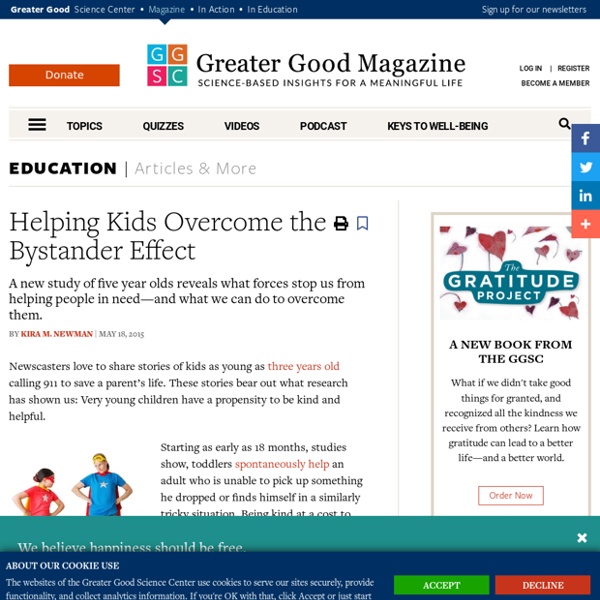Mike Pence and the Bystander Effect in Action
A few weeks ago a friend emailed me to share a story about her daughter, Claire, a recent college graduate living and working in Boston. In March, as it was starting to become clear that the coronavirus was going to severely impact daily life in Massachusetts, Claire, who is Asian, was on the bus heading into work when a clearly crazy man started yelling at her. He told her that she needed to go back to China and that the Chinese people caused all these problems. Being verbally assaulted on public transportation was obviously unsettling. But what was even more horrifying to her mom was that not a single person on the bus came to Claire’s defense.
Overcoming the Bystander Effect: How People Can Help Each Other Online and IRL
Nir’s Note: This guest post is by Max Ogles, who writes at MaxOgles.com. On March 27, 1964, Kitty Genovese was brutally attacked and killed in the open streets of New York City. What makes Genovese’s story so tragic is that police later discovered numerous people were aware of Genovese’s distress but never came to her aid. Though the total number of witnesses is disputed, the story stands as an example of the bystander effect, the psychological phenomenon where people are less likely to assist if they know others are around. But there’s good news. A 2011 research study showed that the bystander effect can actually be reversed.
How to be kinder to strangers in Singapore, Opinion News
The Charities Aid Foundation recently released the World Giving Index 2017, which provides insight into the scope and nature of giving around the world. Based on data collected from the Gallup World Poll, the index, which polled 1,000 individuals in each representative country, revealed two surprising facts. Myanmar, Indonesia and Kenya turned out to be among the most charitable countries, even though they have a huge number of their populations living below the poverty line. Being poor does not stop one from being generous.
How to reverse the Bystander Effect
You see a shopper trip over in a busy street. Someone else can help. That’s what you tell your conscience. This is the Bystander Effect in action – the dilution of our sense of responsibility in the presence of other people – and it’s been demonstrated in numerous studies over many years. But life is complicated and psychologists have begun looking at the circumstances that can nullify or even reverse the effect.
10 Notorious Cases of the Bystander Effect
The bystander effect is the somewhat controversial name given to a social psychological phenomenon in cases where individuals do not offer help in an emergency situation when other people are present. The probability of help has in the past been thought to be inversely proportional to the number of bystanders. In other words, the greater the number of bystanders, the less likely it is that any one of them will help. This list describes the prototype of the effect and cites nine particularly heinous examples. The Parable of The Good Samaritan
Yes, Individual Responsibility Is Essential
In November, Sierra published an article by one of the magazine’s editors, Katie O’Reilly, about her personal struggle in deciding whether to have children in the age of climate chaos and mass extinction. Conversations about procreation are always fraught and, as expected, the essay sparked intense discussion. It was striking, however, that some readers chose to focus on the fact that O’Reilly dared to even consider the idea that individuals hold some measure of responsibility for addressing the climate crisis. Responding to the article on Twitter, a professor at Carnegie Mellon University complained, “The ‘don’t have kids because of climate’ argument is bunk, & absolves the choices of companies & policymakers.”
Overcoming the bystander effect in chemical ethics
For PNNL chemist and Air Force veteran Kabrena Rodda, living by an honor code is second nature. Her time at the Air Force Academy as both a cadet and later an instructor, instilled in her the value—and possibility—of a community that joins to uphold a standard of ideals, honesty, and responsibility. This background made Rodda well positioned to join with the American Chemical Society and the Organization for the Prohibition of Chemical Weapons to establish an honor code for the international community of chemists using The Hague Ethical Guidelines to guide discussions during the drafting. The resulting Global Chemists' Code of Ethics (GCCE) combined grassroots contributions from 18 countries in Europe, Asia, America, and the Middle East to define ethical standards working chemists are already expected to employ. "When we came to consensus on the GCCE, there was enormous enthusiasm about sharing it," said Rodda.
Overcoming the Bystander Effect
Have you ever been a hero? Going about our daily routines, few of us have the opportunity to save a life or disrupt a crime in progress—fewer still take that opportunity when it presents itself. I once witnessed a car accident in which the guilty party leapt from his disabled vehicle and fled the scene. I quickly pulled over and dialed 911. Fortunately, another passerby stopped and apprehended the suspect. The culprit—who was clearly intoxicated—struggled to escape, but he was easily overpowered.




This research shows that children have instincts to help, but they may need a little push at times, otherwise even a 5-year-old kid may succumb to the Bystander Effect. One of the ways to increase children's chances of being active bystanders is to explicitly teach them about the Bystander Effect and its consequences. by agnestan Sep 22
Did you know? Studies have shown that preschool children may also fall into the trap of the bystander effect. Read this article to find useful tips on how we can foster personal responsibility in preschool children to help them overcome the bystander effect. by sherylgoh001 Mar 21